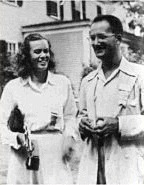- Halmos is an inveterate snapshot-taker.
Lots of people take pictures of speakers they go to hear. Only Halmos photographs audiences he is going to speak to.
He collected fifty year’s worth of candid, black and white snapshots of prominent mathematicians in a book called I Have A Photographic Memory, published by the American Mathematical Society in 1987.
It’s flattering to have him stop you at a book exhibit, say ‘hello,’ and pull out his Instamatic.
- Amidst all the good, Halmos finds some negatives in mathematical life.
“Competitiveness. I want to beat the other guys. At the same time, I don’t like it.”
“Mathematics and mathematicians are so unrecognized by the world.”
- Halmos criticizes government financial support of mathematics.
“It’s unnecessary, offensive and dishonest. If the National Science Foundation had never funded American mathematics, we would have half as many mathematicians as we now have, and I don’t see anything wrong with that.”
- Halmos might have been a good lawyer.
“I was always interested in law. I took three or four courses, separated by years. I used to daydream about how some of the reasoning in law is like mathematical reasoning and how I could make a contribution by making it completely mathematical.”
- Halmos has some ideas about teaching and learning that not everyone agrees with.
Grades: “A = knows(!) the material; B = knows some of it but has gaps (perhaps big ones); C = can use some of it but doesn’t really understand; D = can prove he’s been exposed, but for sure doesn’t know enough to go on; F = doesn’t know the material.”
“I never integrate in public!”
“[In class] I try especially hard never to say anything wrong on purpose (or write it on the board). Mistakes are something else. If you make one or don’t know the answer, don’t bluff. Say ‘Oops, sorry, that’s wrong. Here’s what I should have said,’ or ‘Let me think about it and I’ll tell you next time.'”
“No one can do mathematics on a desert island for more than a short time; it is a collaborative, synergetic activity.” On the other hand,“…. the work of the world is done by people, not by committees. The ideal way to raise quality is to improve the good; the committee way is to fill the pits by levelling the peaks.”
“Mathematics is not a deductive science. When you try to [solve a problem] …. what you do is trial and error, experimentation, guesswork. You want to find out what the facts are, and what you do is in that respect similar to what a laboratory technician does, but it is different in its degree of precision and information.”
“To have but one passion, to channel all one’s energies into one major activity, is especially important for a professional at the apprentice stage of his development. A graduate student in mathematics [for example] doesn’t — shouldn’t — have time to do anything except be a graduate student in mathematics.”
- Halmos has acquired lots of admiring friends and had time for more than just mathematics.
“Sure I had parents (two), and wives (two, one at a time, the present one for forty years), and cats (eight, two at a time, the present two for three years) …. I like Haydn, long walks, Nero Wolfe (a fictional detective), poker, and dark beer, and for a few years I tried TM (transcendental meditation). All that is true, but it’s none of your business — that’s not what this book [his “automathography”] is about.”
“Music and poetry are more important than carburetors and calculus, because both the bus driver and I would be better human beings if we had more in common and because we could then collaborate better to live in a saner world.”
As a seventy-fifth birthday present, as an expression of affection for him and for his contributions as a scholar, writer and teacher, a lifetime of Halmos’ colleagues did not give him a gold watch or a bottle of scotch. They wrote him a book, containing articles about him, the times and places in which he worked, and about mathematics.
- Halmos claims he can “smell” a mathematician.
“Give me an hour alone with a student , and I can tell how good a mathematician the student will be, better than that, give me a few minutes or an hour with a so-called mathematician, and I can tell you if he’s really a mathematician. And in particular, I claim I know me …. I’m a mathematician; I’m a pro; and I know just how un-great I am.” Paul Halmos has very high standards.
“A professional must know every part of his profession and like it, and there are many parts to know. To be a mathematician you have to know how to be a janitor, a secretary, a businessman, a conventioneer, an educational consultant, a visiting lecturer, and, last but not least, in fact above all, a scholar.”
- Halmos worries about growing old.
“Somebody tells me I’m going to have to die sometime or other, and I resent it. I worry about my brain, my eyesight. I don’t want to go ga-ga, and if I don’t, I don’t want to go blind either so I can keep reading and writing …. I’d like to be healthy enough so I can take a little walk.”
- Halmos is still active.
At the age of 80-plus Halmos still participates in the life of the Santa Clara mathematics department, attending colloquia, student-faculty picnics, trivia bowls, etc. His teaching load has been progressively reduced under Santa Clara’s phased retirement scheme.
And he writes.
Last Updated February 7, 2022

